| Micromussa | |
|---|---|
| Scientific classification | |
| Kingdom: | Animalia |
| Phylum: | Cnidaria |
| Class: | Anthozoa |
| Order: | Scleractinia |
| Family: | Lobophylliidae |
| Genus: | Micromussa Veron, 2000 [1] |
| Species | |
Micromussa is a genus of stony corals in the family Lobophylliidae.
| Micromussa | |
|---|---|
| Scientific classification | |
| Kingdom: | Animalia |
| Phylum: | Cnidaria |
| Class: | Anthozoa |
| Order: | Scleractinia |
| Family: | Lobophylliidae |
| Genus: | Micromussa Veron, 2000 [1] |
| Species | |
Micromussa is a genus of stony corals in the family Lobophylliidae.
The World Register of Marine Species currently lists the following species: [1]

Goniopora, often called flowerpot coral, is a genus of colonial stony coral found in lagoons and turbid water conditions. Goniopora have numerous daisy-like polyps that extend outward from the base, each tipped with 24 stinging tentacles which surrounds a mouth.

Pocillopora is a genus of stony corals in the family Pocilloporidae occurring in the Pacific and Indian Oceans. They are commonly called cauliflower corals and brush corals.
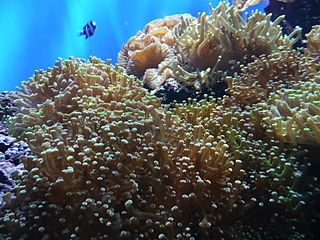
Euphyllia is a genus of large-polyped stony coral. Several species are commonly found in marine aquariums. The genus includes the following species:
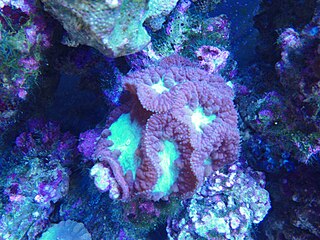
Blastomussa is a genus of large polyp stony corals. It is unclear in which family this genus belongs. Members of this genus are sometimes found in reef aquariums.

Cycloseris is a genus of solitary disc corals in the family Fungiidae. They are found in the Indo-Pacific. They inhabit the lower reef slopes, and the areas between reefs with soft sediments. They tolerate turbid waters.
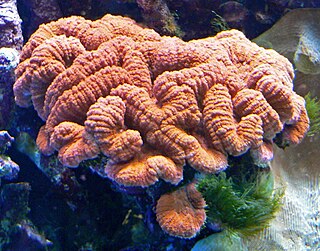
Lobophyllia, commonly called lobed brain coral or lobo coral, is a genus of large polyp stony corals. Members of this genus are sometimes found in reef aquariums.

Galaxea is a genus of colonial stony corals in the family Euphylliidae. Common names include crystal, galaxy, starburst and tooth coral. They are abundant on reefs in the Indo-Pacific region and the Red Sea. They are found in water less than 20 metres (66 ft) deep and favour turbid sites. They are sometimes kept in reef aquaria.

Astrocoeniidae is a family of stony corals. The family is distributed across the tropical and subtropical oceans worldwide.

Hydnophora is a genus of large polyp stony corals in the family Merulinidae.

Isopora is a genus of small polyp stony coral in the phylum Cnidaria.

Echinopora is a genus of stony corals in the family Merulinidae.

Lobophylliidae is a family of large polyp stony corals. The family was created in 2009 after a revision of the "robust" families of Faviidae, Merulinidae, Mussidae and Pectiniidae, which had been shown to be polyphyletic. The family Lobophylliidae was formed out of the Indo-Pacific species that had traditionally been included in Mussidae, and some of the species which had previously formed Pectiniidae, the remaining species from Pectiniidae having been merged into Merulinidae. The type genus is Lobophyllia.

Merulinidae is a family of reef-building stony corals.

Favites is a genus of stony corals in the family Merulinidae. Members of this genus are native to the Indo-Pacific region and their ranges extend from the Red Sea through the Indian Ocean and Western Pacific Ocean as far as Japan, the Line Islands and the Tuamotu Islands.
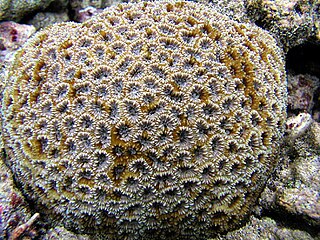
Dipsastraea is a genus of stony corals in the family Merulinidae. Members of this genus are native to the Indo-Pacific region. They are zooxanthellate corals.

Echinophyllia is a genus of large polyp stony corals. Members of this genus are colonial corals and are generally foliaceous, usually with very thin leaves. They are native to the Indo-Pacific and are sometimes found in reef aquariums.
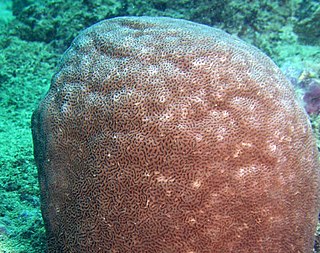
The Coscinaraeidae are a family of stony corals found in the Indo-Pacific region.

Cyphastrea is a genus of massive reef building stony corals in the family Merulinidae, commonly known as brain coral.

Leptastrea is a genus of massive reef building stony corals known primarily from the Indo-Pacific. Although previously assigned to Faviidae, Budd et al. (2012) assigned it to Scleractinia incertae sedis based on phylogenetic results demonstrating the polyphyly of Faviidae.

Paragoniastrea is a genus of stony corals in the family Merulinidae.